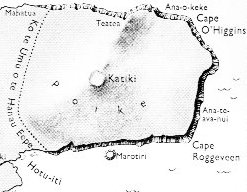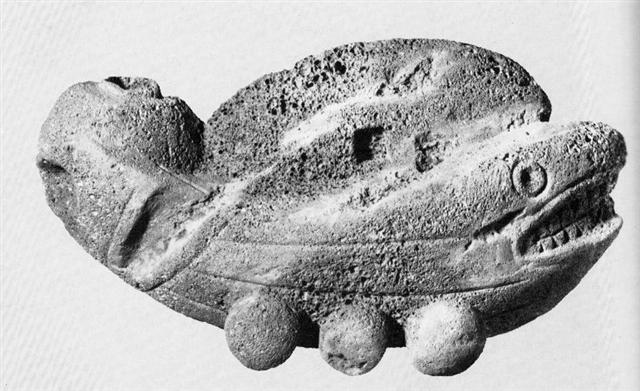HOW THE SHORT-EARS CONQUERED THE LONG-EARS The Long-ear people were strong, they ruled. They lived out there on Poike, the headland, where the ground is not covered with heavy stones. They stretched their ears with ornaments, those people, they made them long.
The Short-ears lived on poor land that has many stones. The Long-ears wished to build more ahus near the shore, more ahus for the gods. They said to the Short-ears, 'Come and carry stones with us to the place for the ahus, this will make your ground clean.' The Short-ears would not do it. They were afraid that the Long-ears would take their land when it was made cleaner. 'We do not want to carry the heavy stones. Leave them on the ground for our food plants, to make them suffer - for the kumara, the banana trees, the sugar-canes, to make them suffer and grow.' The Short-ears would not work for the Long-ears, they did not carry them, they left the stones. The Long-ears carried all the stones to build their ahus, angry with the Short-ears. They built their ahus. They also thought evil against the Short-ears. They dug their long pit like an oven. They dug it, they brought firewood, they strewed the whole pit with firewood. The Short-ears did not know for whom the Long-ears were making that oven. [... The Maori used the same word for both solstices, marua-roa, 'long pit', and applied the term also to the month or season during which the Sun passed through its most northerly or southerly declination ...]
Ka. Particle of the affirmative imperative, of cardinal numerals, of independent ordinal numerals, and of emphatic exclamation, e.g. ka-maitaki! how nice! Vanaga. Ká. 1. To light a fire in order to cook in the earth oven (see umu): he-ká i te umu, he-ká i te kai. 2. Figuratively: to fire up the soul. To put oneself in a fury (with manava): ku-ká-á toona manava he has become furious. Vanaga. 1. Of T. 2. Imperative sign; ka oho, ka tere, ka ea, begone!; ka ko iha, a greeting T; ka mou, hush; ka oho, goodbye. 3. Infinitive sign; mea meitaki ka rava, a thing good to take; ka harai kia mea, to accompany. 4. A prefix which forms ordinals from cardinals. 5. The dawning of the day. 6. Different (? ke). Churchill. Tiki. 1. Chief, boss, director, coordinator; expert, master in a craft, a science, or an art; tiki rerorero kohau rogorogo, rongorongo scribe; tiki moai, sculptor; tiki ahu, master builder who directs and coordinates the construction of ahu; tiki îka. master fisherman, professional fisherman. 2. Ancient title, probably meaning 'grandmaster', used before the names of gods and semigods. Only vague memories remain today of Tiki Makemake, Tiki Te Hatu, Tiki Hati. It is said that the main one was Tiki Makemake and that Tiki Hati was the chief of a band of ákuáku. Vanaga. Sick, ill. [Imported from the English language.] Churchill. There was a woman of the Short-ears who had a husband of the Long-ear people. She lived at Potu te rangi, that was where she had her house, at that end of the Long-ears' pit. One day her husband in anger said to her: 'This pit that is being dug is for all you Short-ears!' He went away angry; left that woman. Then that woman knew, knew for whom the pit was made. She waited. At night she went to her people, went to the Short-ears and told them: 'Watch my house. Watch it for the sign that I shall give. On the day after tomorrow the Long-ears are to light the oven for your corpses. Form yourselves into a line, make everybody join in, come there, make a circle round the Long-ears, round their land of Poike. Start killing them. Throw them into the pit, change that oven to your own and cook the Long-ears for yourselves.' Before the dawn that woman went back to her house at Potu te rangi. She said to her people, 'Be quick and do.' Then she went to her house and stayed there, plaiting a basket in the doorway. She was plaiting a basket with her eyes on the Long-ear men. They were filling their oven with firewood. When it was sunset the Short-ears gathered. It was already dark; they gathered, they came; the first men hid in the house of the woman who was plaiting the basket. The rest concealed themselves behind, they formed a line, they waited. The woman who was plaiting told them where the Long-ears were. They were in their houses. Therefore the Short-ears went around Kikiriroa and Mount Teatea. They drew up all in order, they marched in the night, they came down to the point of Mahatua. They remained there, they slept, they hid themselves. And at the first light all those Short-ears rose up, they rushed out with their spears and surprised the Long-ear people, they were all still resting in their houses. They rushed and chased, those Short-ear men, they chased the Long-ears out. They made them all run to the ditch which they had dug themselves. They lit the fires. When the Short-ears rushed upon them the Long-ears dashed out of their houses, they all ran away, they ran toward the ovens. No other way could the Long-ears run, the Short-ears were behind and all around them. All the wives, all the children of the Long-ears ran, they rushed toward the pit. The men, the women and the children arrived at the pit, stopped there. They were afraid of the flames. The war-party of the Short-ears came behind them with their spears. Which way could the Long-ears escape from the heat of the fire? There was no way. The war party of the Short-ears came on, they yelled at the Long-ear people. Then all the Long-ears began jumping into their earth-oven, jumping into the flames. In the flames they jumped, they went on jumping. Their hair was burning, the Long-ears went on jumping. The men, women and children - all were burned. Two of the Long-ear people stepped over the bodies; these two men jumped and fled across the land. The Short-ears went round the pit and chased them. All the way to Anakena they chased. They arrived at Anakena, those two Long-ears, they ran into Anavai - the cave that has fresh water. They hid themselves in the darkness there. The Short-ears brought a long stick and they poked it at those Long-ears hidden in the cave, poked and poked. The Long-ears became mad, they showed their faces and jabbered: 'Ororoin, Ororoin.' It was finished. One of those two died. The other lived, came out; he jabbered. Said one of the Short-ears to the chiefs: 'Important men, let us spare this man who is now alone. Why kill this person? Leave him.' The war party returned to Potu te rangi, they looked at their oven to see whether any of the Long-ears were still living. None remained. All of those people were dead. The Short-ears took as much as they wanted; then they covered them with earth. They returned to their homes. He remained, that one man of the Long-ear people. He joined the other people and lived at Turtle Bay. He took a wife and made children. He was the jabbering man of whom they said 'Ka hakarere mahaki etahi' - 'Let us spare this one man only.' I know an old man called Arone arapu; a man of the blood of the Long-ears. The war was in the time of Hotu matua's children. There are today two men alive who are of that blood; one lives at Hangaroa and one is where the lepers are kept; children of the blood of the Long-ears.
|


